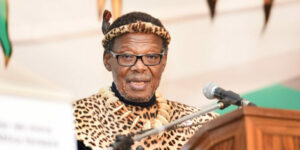The AmaZulu royal family is preparing for the three-day-long cleansing ceremony, which would end the mourning period for the widows of the late King Goodwill Zwelithini kaBhekuzulu , later this month.
In Zulu culture, the cleansing ceremony is necessary for, typically, the immediate family as an act to signify the end of the official mourning period for the deceased and to spiritually assist the family to move forward. In this case, because a nation lost its father, various cleansing rituals take place.
The 12th of March has become etched in the mind of the AmaZulu nation when its monarch of almost five decades, King Goodwill Zwelithini kaBhekuzulu passed away in hospital. Within a month the regent, Queen Mantfombi Dlamini-Zulu passed away as well. AmaZulu traditional prime minister, Prince Mangosuthu Buthelezi has announced that the cleansing ceremony for the King’s widows will take place from the 16th to the 18th of June.
Dr Bhedlindaba VVO Mkhize from the Umsamo Institute says the first ritual was the cleansing of the tools that were used during the funeral, which is known as ukugeza amakhubalo. Mkhize says people are then allowed to work their fields again.
“The second ritual that is normally performed is the one called umxokozelo. Umxokozelo is where now people can start getting to the parties, getting into their individual work, everyone is released and some of them, under those circumstances, they even take away what we call the morning dress Inzilo, as it is going to happen in the Undlunkulu. We have been told that the cleansing will be happening from the 16th up to the 18th of June,” says Mkhize.
The reign of the late King Goodwill Zwelithini kaBhekuzulu:
Buthelezi also announced that the cleansing ceremony for the AmaZulu nation is expected to take place next year.
Significance of cleansing ceremony
Mkhize explains the significance of such a ceremony.
“The one that is coming next year is for the whole nation, remember that the King was a leader of a nation not only of a particular clan or family, but it was of the nation. The nation must be released, must be cleansed, because if you are a Zulu speaking person the belief is that the King who happened to be like a father for everyone must not come back as a shadow to the nation, because you might find that King Zwelithini [kaBhekuzulu] and also uNdlunkulu was the mother and the father of the whole nation. Therefore that kind of a shadow must be removed from the nation as a whole,” says Mkhize.
Professor Sihawu Ngubane from the University of KwaZulu-Natal explains the cleansing process. Key role players are the heir or eldest son, and an elderly woman in the family. Married daughters are also cleansed to ensure that they do not take this dark cloud to the families they are married to. Ngubane says a cow will be slaughtered for each wife.
“When we start the process of ukugeza which is cleansing, the key role players are the firstborn or the heir of the family and the eldest lady in the family. The heir should provide cows for each of the queens, then the cattle will be slaughtered, they take the cow dung, which is called umswani in Zulu, mix it with the gall – inyongo and then they put ashes into the water. They will go and wash their hands in the dirty bowl with all these herbs,” says Ngubane.
A look at the King’s reign:
Ngubane says the widows then proceed to wash their bodies in the river.
“Once they have washed their hands there, then they will go to the old lady, who is responsible for cleaning them, literally cleaning them using this water, thereafter they will go to this clean bowl and wash their hands and then the process is over. What is important is that once they have cleansed, then they are free to go to the river , when they get to the river they will take off the clothes that they are using at the moment and they will dig a hole and bury those clothes and then ready to wear the new clothes to indicate that now they have been cleansed. Then they can come home and eat and enjoy the meat,” says Ngubane.
When King Shaka’s mother, Queen Nandi died in 1827, King Shaka ordered a time of public mourning during which no crops could be planted. Ngubane says King Goodwill Zwelithini kaBhekuzulu emphasised that he did not want people to mourn for a long period.
“When the King passed on we were saying the nation is in mourning, so we want to break the mourning period, Maybe if I can take you back in history when Indlovukazi uNandi passed, King Shaka forced the whole nation to mourn. They were all mourning, they couldn’t go and plough. They sat at home until such time that one of the closest friends of King Shaka went to Shaka and said this is over, it was after a year. And people were dying because there was no food,” says Ngubane.
The royal family says it cannot comment on the preparations of the cleansing ceremony as it is a family matter.






